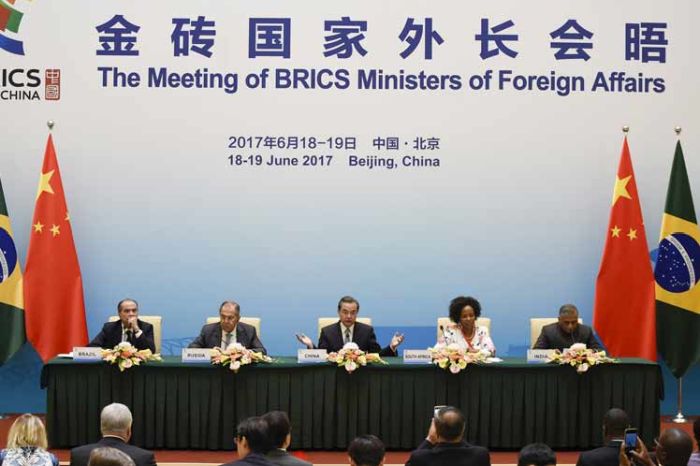
The gathering was attended by the ministers of Foreign Affairs and International Relations from all the BRICS countries
Trade, climate change, reforms of the United Nations and fight the scourge of terrorism were high on the agenda when BRICS Ministers of Foreign Affairs met in Beijing, in preparation for the group’s 2017 summit to be held in Xiamen later this year.
Brazil, Russia, India, China and South Africa (BRICS) make up the blossoming group that account for about 40% of the world’s population and 20% of the global economy.
The gathering was attended by Ministers of Foreign Affairs and International Relations from all the BRICS countries such as Maite Nkoana-Mashabane, of South Africa; Wang Yi, of China; Sergey Lavrov, of Russia; Aloysio Nunes, of Brazil, and Vijay Kumar Singh, of India. In a final statement, the ministers reaffirmed their commitment to safeguarding the purposes and principles of the charter of the United Nations, as well as a fair and just international order, while complying with the groups’ goals.
BRICS was initially formed as an economic concept. All five members are developing countries and emerging markets, and share the same or similar positions on some major international issues. Their cooperation is underpinned by political security, economy and finance, and people-to-people exchanges.
Its member States not only contribute to safeguarding international peace and security, but also helps protect the common interests of developing countries and champions the democratization of international relations.
In their Beijing meeting, the BRICS Foreign Ministers reaffirmed the need for a comprehensive reform of the UN, including its Security Council, with a view to making it more representative, effective and efficient, and to increase the representation of the developing countries so that it can adequately respond to global challenges.
China and Russia reiterated the importance they attach to the status and role of Brazil, India and South Africa in international affairs and support their aspiration to play a greater role in the UN.
While underscoring the importance of the full implementation of the 2030 Agenda for Sustainable Development, BRICS countries urged the developed countries to honor their official commitments to make that agenda reachable.
They also called on all countries to implement the Paris Agreement under the principles of the United Nations Framework Convention on Climate Change.
In particular, they called upon developed countries to fulfill their commitment on this relevant issue to provide necessary financing, technology transfer and capacity building support to developing countries.
Their call comes following US President Donald Trump’s decision to withdraw from the Paris climate agreement. On terrorism, the ministers deplored the continued terrorist attacks and reaffirmed solidarity in the fight against it.
The ministers voiced their concerned by the threats and challenges posed by the use of ICTS (Scientific Infrastructure and Singular Technology) for criminal and terrorist purposes and outer space militarization.
Particularly, they underscore the role of collaborative efforts to address these challenges.
They also called upon the international community to establish a genuinely broad international counter-terrorism coalition and support the United Nations’ central coordinating role in the international counter-terrorism cooperation.
On other international relations, the group rallied behind political and diplomatic solutions to conflicts in countries such as Libya and the Korean Peninsula.
With respect to Syria, the BRICS ministers reiterated that the only lasting solution to the Syrian crisis is an inclusive ‘Syrian-led, Syrian-owned’ political process which safeguard the state sovereignty, independence and territorial integrity of Syria, in pursuance of the United Nations Security Council Resolution 2254 (2015).
They strongly supported the Geneva Peace Talks and the Astana process, and welcome the creation of the de-escalation areas in Syria. They oppose the use of chemical weapons by anyone, for any purpose and under any circumstance.
They also reiterate the need for a just, lasting and comprehensive settlement of the Israeli-Palestinian conflict in order to achieve peace and stability in the Middle East.
In response to Western media criticism, Geng Shuang, spokesman for the Chinese Foreign Ministry, denied the BRICS countries were forming a ‘clique’ to target or replace other world groupings in an effort to counteract Western influence.
‘BRICS countries have always been unified by a spirit of openness, inclusiveness and win-win cooperation, and there has never been any intention of forming cliques or political or military alliances, to target, slander, challenge, or replace anyone, and [the bloc] stands ready to work with all countries for a community of shared future,’ Geng assured.
 Escambray ENGLISH EDITION
Escambray ENGLISH EDITION





Escambray reserves the right to publish comments.